By Fadil Paçrami
Part seventeen
Memorie.al / What is prison? It is the place where those who have been sentenced to deprivation of liberty are kept, we would say by reading any dictionary. But that is little. Prison and freedom – two opposites. Previously: what is freedom? In short: to be free means to do what you want, to think and act as you wish in the exercise and fulfillment of your freedoms and rights, as a person and as a citizen, but always without harming and violating others. . Again: to think and act. We are talking about democratic freedoms, from those of speech, press, assembly and organization in various parties and associations, ensuring the conditions where ideas, requests and human wills can find expression and concretization, from those of the biological-related plan with the being itself, to those of the social plan, related to the ways of living.
Continues from last issue
– It didn’t take long and in those days, all kinds of pressures began, up to not sending grain supplies, arrogant behavior, sending an official and open accusation, which spoke of the crystallization of an anti-Yugoslav front at the head of the party and the state. After a while came the second accusation, this time blaming Nako Spiron and his “elite” by name. Nervousness and intrigues began.
When it was finally discussed in the Bureau, about the above, some of us were not called to the meeting. The result: Nako Spiro killed himself; some of the rest of us were expelled from the Politburo and the party. The infamous VIII-th Plenum of the Central Committee of February ’48 paved the way for the devouring of Albania by Yugoslavia. But there was no time, because the Moscow-Belgrade conflict broke out openly.
– In November 1947, after the suicide of Nako Spiro, Koci Xoxe gave a speech at the Party School, where he spoke extensively and in a major tone, about the Albanian-Yugoslav friendship and the betrayal of Nako Spiro. The next day, by his order, Manush Mufti called me to ask me what I had in mind, and what was the meaning of the disparaging and suspicious words that I had expressed somewhere with others, about that speech and all that speech, where threats were made against anyone who thought differently. This was the warning for what happened to me those days.
***
Indeed, after the conviction of Koci Xoxes and his gang, I was quickly rehabilitated, but Enver Hoxha did not forget that my opposition during those years was not an accident; therefore I had to be treated with care, until it was clarified, as far as the reserves and views reached also for other issues.
This was from now on, the permanent position towards me, until the year ’73, pull it and don’t tear it. So, I was not even elected to the leading bodies of the party, in the 1st Congress. Enver Hoxha did not stray, if he had doubts about anyone, the less he forgave, if you insulted him even just at the seder, even more so, if you knew of any weakness. He would put you in that little notebook he carried with him and you would never come out of there.
The year 1960s
The case made me aware of what I will say below: – When the PPSh delegation came to Moscow to participate in the meeting of 81 parties, which was to be held in November 1960, which it was directed by Enver Hoxha, where Mehmet Shehu, Hysni Kapo and Ramiz Alia were also members, since I happened to be there for studies, they drew me to them. It immediately struck me that everything spoke of a general tension and irritation with the locals.
The delegation was located in a villa, where there were several meetings with leaders of the Communist Party of the Soviet Union, such as Mikojani, Suslovi, Kozlovi, etc., during which a lot of contradictions and open disagreements came to light. It was decided that Enver Hoxha would also meet with Nikita Khrushchev those days, before the meeting of the 81 parties began, to square some of them, but Enver Hoxha had not come to quell, but to start a fight, as and it happened.
Using the opportunity, that in a letter of the Communist Party of the Soviet Union, sent those days to the Communist Party of China, something was also mentioned about Albania, he took steps calculated for the explosion and the rise of tensions, canceling the planned meeting. He also abandoned the villa, as a sign of distrust, and settled in our embassy in Moscow.
Two days later, he agreed to meet, but as it turned out, he did not go to find points of rapprochement; on the contrary, he ignited the fires further, which can be understood from the explanations he gave when he returned, as well as later in his writings, about how they clashed, the harsh words they exchanged and how they parted without saying goodbye. It was said then, and later, that in our embassy in Moscow, eavesdroppers were dictated.
Maybe, they all happen in dictatorial countries, just as everything is made up, when it suits the parties to the conflict. Since I was there, I will talk about that scene. We were staying in one of the halls of the embassy. They were Enver Hoxha and others. Meanwhile, Mehmet Shehu entered, with some kind of device (for detecting eavesdroppers, as it was said), in his hands and started checking near the thermosiphons and the corners of the salon.
We were following him with our eyes. Someone said that; checks there are no eavesdroppers. Suddenly he took a chair, sat on it, reached out with the camera towards the chandelier and just as soon as he let out a ton of words, full of insults in Russian, in his direction. After a while he said: “The device showed that the eavesdropper is here, now they cut it off.” That’s what happened, that’s what was said. True? Staging? Comments began to be made, of course with swearing.
– On the day that Enver Hoxha gave his famous speech at the Meeting of 81 parties, which has been talked about, the reaction in the hall, was obvious. Everything he threw was really a bomb, as they were called. When the delegation returned to the embassy, there were hugs and greetings, as if for a marked event, both relieving from a worry and anxiety, as if they had been saved from an evil that was hanging over their heads, like the sword of Damocles.
The goal was achieved: Enver Hoxha, for a long time, lived with the nightmare of being overthrown by Olympus, where he was at the head of the party and the country, now that there has been a stir and it will be more difficult. The cries for principles and ideological colors were nothing but masks. After this speech, he did not appear again at the meeting that continued in the Kremlin and left for Albania by train, to Budapest, and from there by our plane, through Italy and the Adriatic, to Tirana, under the pretext that November 29 was approaching and should have been there for the party.
Years 1973 – ’74 – ’75
– About ’73, I spoke above. I will only add that after the 4th Plenum, Enver Hoxha suffered a heart attack, which had serious consequences for his health, so much so that he barely took it himself, as well as for all that happened afterwards. – The disease caused his close circle, mainly Mehmet Shehu, Hysni Kapo, Kadri Hazbiu and Ramiz Alia, to be put on the move, as it happens from time to time in such cases, known for centuries in the royal courts, when seen that the sovereign can quickly leave this world and the question of the inheritance of the throne arises. For analogies, we also remember what happened in the Soviet Union, after 1953, when Stalin died.
They show that even Enver Hoxha, who was worried about this, since he had not clearly determined who would take his place, would ensure the continuity, even though his keen eye, in matters of palace intrigue, was not spared without notice behind the scenes, with their directions. As it happens in such cases – palace rivalries, even in the contenders’ camp, intrigues were brewing against each other. While in front of the sovereign, they begged for loyalty, each one weaved to crack with his elbows on the bones of others, towards the top of the pyramid. Against this background, friendships and groups took shape, as well as enmity and rivalry.
The most powerful trio, that; Mehmet-Hysni-Kadri, so: State-Party – Security. What about the Army? Beqir Balluku was not capable of these games, so he was an obstacle. Then? It had to be eliminated. Enver Hoxha’s closeness to him was frowned upon, not that he had any appreciation for him, but he needed it – it was the issue of the army. What about Ramiz Alia? He was known as a “Demke” of Enver Hoxha and so much so that he could become anyone else’s tomorrow.
So even Mehmet Shehu did not harass him in ’73, when the ideological sector was hit and some voices were raised against him, as a backup card, when he needed it. Enter Kapo, he also knew this side and kept it under his arm. And Kadri Hazbiu, with the eyes of a policeman, looks at him suspiciously. On a level somewhere below, stood Manush Muftiu, but in the shadow of Hysni Kapo, as well as Abdyl Këllezi, under that of Mehmet Shehu. The others from the Political Bureau retreated.
On one of those days, when Enver Hoxha began to recover himself, to feel better and began to go out, while they were walking together in the form of a walk, on that main road of the Block, how it happened, but not without purpose, this put his arm into Beqir Balluk, leaving the others a little behind, and walked a bit of the road talking, Mehmet Shehu and Hysni Kapo, understood this as a gesture, which meant that the army always remains the strong support for him.
But Petrit Dume, who was known as Mehmet Shehu’s, and Hito Çako, who was known as Hysni Kapo’s, were also in the army. Then? Therefore, Beqir Balluku had to be eliminated. And the game was played. Some time ago, in a meeting of the Political Bureau, since Beqir Balluku had prolonged for months the presentation of draft theses for the army, as was decided and requested, Mehmet Shehu raised this issue, criticized it strongly and said that he was ready to put himself to that work. So it was decided.
He prepared them in a few days, as it seems he had them ready, since he had been dealing with them for a long time, and it was decided that they should be discussed beforehand, with some of the cadres, in order to gather some opinions. Mehmet Shehu himself placed them in a wide auditorium at the Party School (why there and not in any of the military schools, this was not without purpose). They also distributed the main cadres in the army. They say that from their side, there were also some remarks.
Beqir Balluku talked about these with Enver Hoxha and he told him to collect them carefully and get them ready, in order to complete the draft theses presented. Beqir Balluku called in Pogradec, in one of the rest houses there, three soldiers he considered to be the most experts and charged them with this task. They processed them and handed them over to him, who also gave them to his assistants – Petri Dumes, Hito Çakos, etc.
When Mehmet Shehu found out about this, he took the opportunity and launched an open attack on Beqir Balluk, calling them “antitheses”, or “black theses”, as they were named later, related to the so-called; “sliding theory”. As it had happened in other cases (let’s remember Nako Spiro in ’47), Enver Hoxha again made the defendant, in a word, left Beqir Balluku in the mud, and even pretended to be angry.
When Mehmet Shehu, Hysni Kapo and Kadri Hazbiu told him that there were some other serious things about the situation and disagreements in the Ministry of Defense, and that they had thought of raising them once and for all in the Defense Council, he agreed but said that, as he was not yet feeling well, he would not attend, as was suggested. That’s how it happened.
The meeting was led by Mehmet Shehu, where Hysni Kapo, Beqir Balluku, Kadri Hazbiu and Petrit Dume participated as members of the Defense Council. Antitheses were also discussed there. Beqir Balluku did not say anything, that he had acted on the orders of Enver Hoxha and that he was aware of everything, even though he felt abandoned by him. Apparently, he still believed that at the right moment he would do something to close the matter.
He admitted that he had not acted correctly; he also admitted that there had been some misunderstandings between him and Petri Dumas, but he would try to avoid them. Here, apparently, according to a pre-prepared scenario, Petrit Dume raised the issue, that it was not about misunderstandings, nor just some disagreements, but about deeper, principled issues of worldview character, strategy and military tactics.
That’s what Mehmet Shehu wanted and jumped in: “Let’s stay a while and explain ourselves better”! He called them very serious, hyperbolized and labeled them as he wanted. This was also reported to Enver Hoxha. He remained silent and decided to finally abandon Beqir Balluku, which happened at the July ’74 Central Committee plenum, where he was dismissed from the high party and state function.
But before even two months had passed, he made a maneuver that confused everyone: he hit Petrit Duma and Hito Çakon hard, indirectly also Mehmet Shehu and Hysni Kapo, as well as against a number of generals and other military cadres, in whom he had lost trust. This time, it was Mehmet Shehu and Hysni Kapo, who left their people in the mud. This is how this work went. There is nothing here, therefore, of what was said to them at that time and later, about the military coup that led to their shooting and the explanation that Enver Hoxha gave afterwards, in his book “Titiste”, where he wrote:
“In 1973, the group of Beqir Balluku was put into action, preparing the military coup with the “black theses”, the theory of the slide, leaving the coast and the cities, the imperialist aggressors, the masters of Mehmet Shehu. Beqir Balluku was unmasked Petrit Dume and Hito Çako, who were in the conspiracy, also abandoned him.
Mehmet Shehu, who was at the head of the conspiracy and played the strings behind the scenes (now it turns out that all the strategic plans were worked out against the plans of the Defense Council and these black materials, as they were called when they were discovered, were approved by him ), tried to save Petrit Dumen and Hito Çako. They had high hopes for Mehmet Shehu, that “your head would not be cut off”, as he told them in the plenum of the Central Committee, which was gathered at that time for these problems, and they did not give Mehmet; but even this could not save him from the risk of harming himself”.
Later there was a rift between Mehmet Shehu and the duo; Enter Kapo and Kadri Hazbiu. What happened, without the passing of just a few months, with the “saboteurs of the economy”, as they were called, they say that the game started like this: oil jobs were not going (not only there, but also in other fields and branches of the economy that started to be felt after the first signs of breaking with China), that is why a meeting was held with the cadres, where the oil was extracted. Abdyl Këllezi and Koço Theodhosi were sent to participate.
Suddenly, but not by chance, criticism erupted; attacks and oppositions, with mutual accusations; there was also talk of sabotage. After the earthquakes that had occurred and feeling that others would also fall, there was no more peace, not only around the “Pyramid”, but also below – intrigues, arrivists and cowards, flatterers and accusers everywhere. Oh horror, what’s going on? In order to distance himself, Abdyl Këllezi left the meeting before it was over and returned to Tirana, where he went to report to Enver Hoxha about the situation and what happened.
He listened as if attentively, but what list he had entered, this was seen very quickly, with the “storm” that broke out against the “saboteurs in the economy” and the proportions it took, up to the capital punishment of those he called guilty. The blame had to be placed somewhere, for the difficulties the country was going through, in the field of economy. The reasons were other, deeper, they became clear later: they were a consequence of the path he had followed, of that short-sighted policy of isolation, arrogant and, against everyone, followed for a long time and since the years The 70s came deepening, while the reserves were running out and the country was heading towards collapse!
Year 1981
This is how we come to the end of Mehmet Shehu. As is known, all the time, especially since the 1948s, he was the right hand of Enver Hoxhēs, his closest collaborator and assistant, in the design and implementation of that policy of terror, criminal and destructive. , in which the dictatorship led the country. He was particularly distinguished for his ferocity, inclined and unrestrained towards crime; for haughty conceit; he was an all-knowing specialist, in all fields – political, military, economic, legal, educational and cultural, etc., arrogant and with a repulsive phobia towards the progress of the intellectual values of the time.
But when did Enver Hoxha lose his faith? They say – even from the development of events, it becomes clear – that after what happened in ’73, ’74 and ’75, the dictator put him on the list of those who should be eliminated. At first he caressed him, but immediately, a little today, a little tomorrow, step by step, he separated him from his closest people, some of whom he disappeared, others he pulled away and isolated. After Petri Dumas and several generals, as well as Abdyl Këllez and others, he made a breach and inserted wedges between him and Hysni Kapo, lured Kadri Hazbi from himself and pulled him away, surrounded him with other incompetents, intriguers like Hekuran Isai and Simon Stefani, began to attack him from many sides and tricked him, until he committed suicide on the 81st.
It was June; July of that year, when one of his sons announced his engagement to a girl from an affected family, as they were called then, that had its people, as far as America, as political refugees and opponents of regime. Here he started the fatal blow, – he got the chance. Although he was aware of this, he went to congratulate the family and, with a part of his scotch, where the most joyful words were expressed, and many photographs was taken, of course. So, everything seemed to fall into place, as it could not be better.
That fall, in November, the VIII Party Congress would convene. District conferences began to be held, for the election of delegates, and in September Mehmet Shehu went to one of them, the one in Korça. He arrived two days before the meeting, but the next day, Enver Hoxha, called him to come urgently to Tirana. Strange, but no, this also counts.
He was forced to postpone the conference and leave. When he went to Enver Hoxha, he told him that he had received accurate information, which he had not known before, about his son’s fiancee, how that engagement was expected, in certain ballistic-zogist circles and of other fugitives in America, that even the photographs taken at his house, the days of the engagement, when they came to congratulate him, had ended up in the hands of the American CIA. Memorie.al
The next issue follows




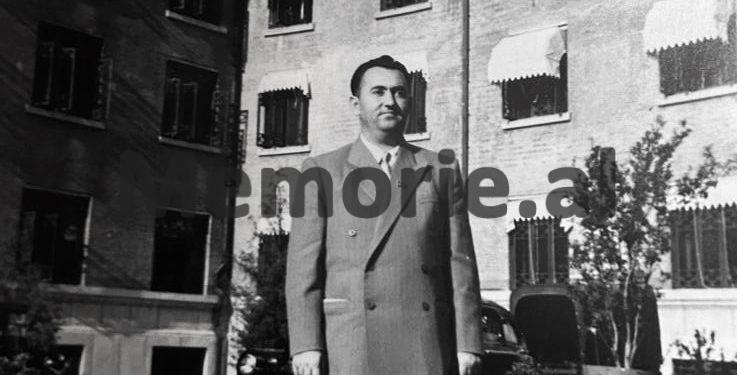
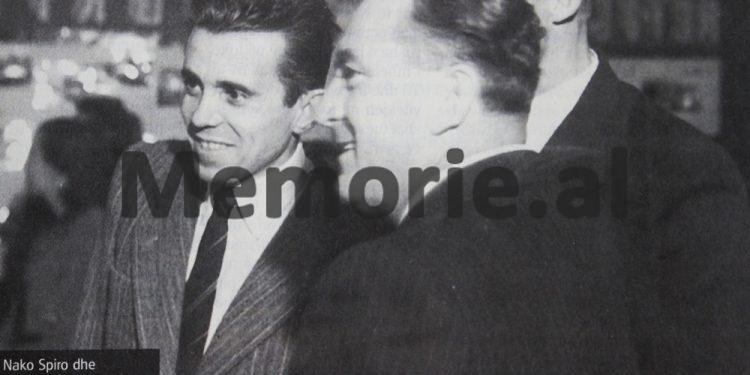
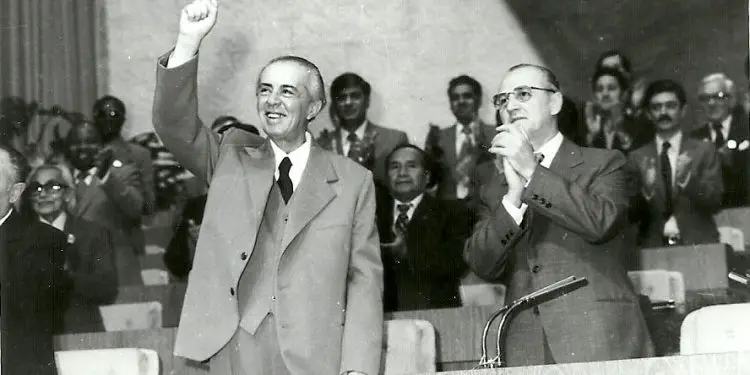
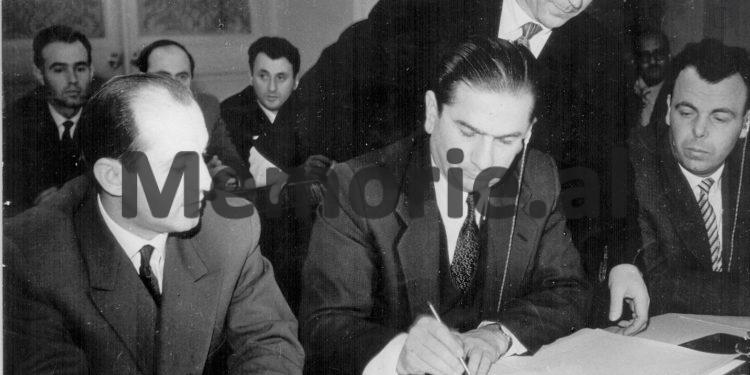
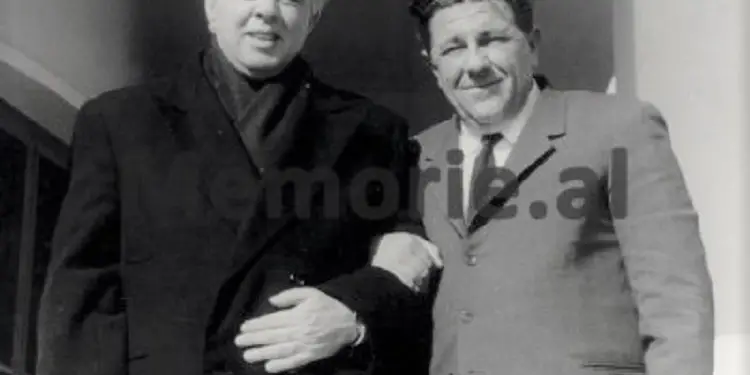
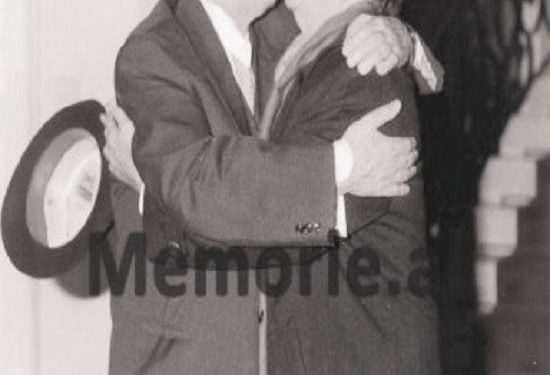
![“When the party secretary told me: ‘Why are you going to the city? Your comrades are harvesting wheat in the [voluntary] action, where the Party and Comrade Enver call them, while you wander about; they are fighting in Vietnam,’ I…”/ Reflections of the writer from Vlora.](https://memorie.al/wp-content/uploads/2025/06/admin-ajax-4-350x250.jpg)


![“The ensemble, led by saxophonist M. Murthi, violinist M. Tare, [with] S. Reka on accordion and piano, [and] saxophonist S. Selmani, were…”/ The unknown history of the “Dajti” orchestra during the communist regime.](https://memorie.al/wp-content/uploads/2026/02/admin-ajax-3-350x250.jpg)
![“In an attempt to rescue one another, 10 workers were poisoned, but besides the brigadier, [another] 6 also died…”/ The secret document of June 11, 1979, is revealed, regarding the deaths of 6 employees at the Metallurgy Plant.](https://memorie.al/wp-content/uploads/2026/02/maxresdefault-350x250.jpg)

